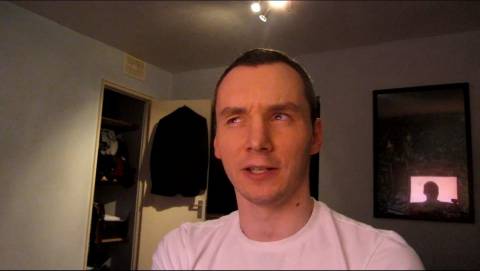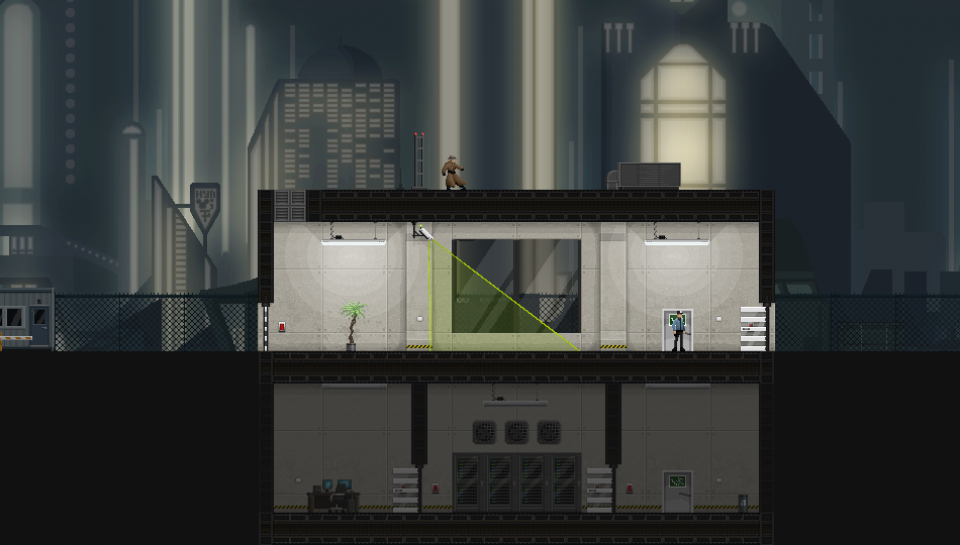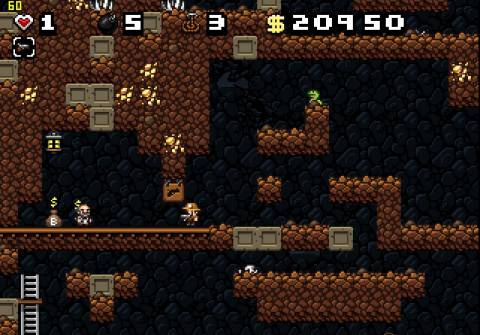“I will probably never write another news story again.”
That’s either a quote from yours truly on his inevitable death bed, or a comment from Gunpoint designer Tom Francis. His joke comes weeks after announcing the success of his (excellent!) debut game has allowed him to quit his day job at PC Gamer and make games full-time.

Yes, Francis is one of those dastardly video game writers who has gone on to make them. He’s on the other side, one of those people. We are lucky for it, and it was inevitable. Gunpoint’s creator has been thinking about games for a very long time, but arriving at this point took many years.
Gunpoint is a side-scrolling action puzzler, wherein players zip a spy wearing magical pants around the world at lightning fast speeds, and manipulate electronics to your own, nefarious ends. The door in front of you will not open? Don’t worry, just flip into crosslink mode, wire a light switch to the door, and when you flip the light switch on or off, the door will open and close, too. It's one of 2013’s best, smartest games yet.
In high school, Francis would flip through game magazines and dream about a life where he spent all day playing and writing about games. (I wish that were true.) He even found himself chatting back and forth with developers, including Diablo III lead designer Jay Wilson, designing the cult classic shooter Blood at the time.
“I would email the lead designer of whatever game I was playing and just suggest things to them,” he said. “ [...] I would email him just every day to tell him ‘oh, you should add this weapon! And you should have a weapon that does this! And you should do this and this and this!’”
To Francis’ surprise, Wilson would email back, and let him know how those ideas jived with what the team was building. Back then, Wilson was working on the much less thrilling sequel, Blood II: The Chosen.
The gaming dream adjusted itself during college university, where his aims shifted to game development. When he graduated, there was some downtime, so he tried to put it to good use. Design was on his mind, even if it wasn’t clear what the path forward was. Francis wrote a pilot for a sci-fi TV series. Naturally, Futurama and Firefly were soon cancelled. But he also spent time writing a design document for a game.
“Obviously, any indie developer today will tell you that you don’t write a design document,” he said. “That’s not game design. Game design is [when] you actually try making the game.”
This was around 2003, though, and the idea of striking it out on your own has come a long way since then. This is before Braid, Super Meat Boy, or other trailblazers that proved it was possible to make games without a publisher support system. These games helped prove small teams could produce games as meaningful as what the biggest studios were creating. So Francis quietly tucked away his dream of making a game.

“It was just totally ingrained in me that I could never do this,” he said. “There was never a job opportunity. It was like wanting to be the CEO of a company. You can’t just start as that, you have to do the other things in-between beforehand. [...] In the back of my head, I thought ‘this is probably what I’m supposed to do. I enjoy this so much. I’m excited to get up in the morning to do it, and I work on it late on night, and I get up the next morning even earlier to get a head start on it.’ I just never tire of thinking about it, but, also, it’s completely impossible. There’s no way anyone can actually ever do this, unless you happen to get the right career path through a developer.”
Francis started living with a friend in Bath in the United Kingdom, which also happened to be where PC Gamer UK was located. When an opening at the publication appeared, his high school persona emerged. Not only did he land a job, he’d landed the job, the one he’d dreamt about. But for Francis, inspiration soon came from nearby with Introversion Software’s strategy game, Darwinia. Released in 2005, Darwinia was a genuine indie darling, one of the earliest of its kind.
But despite Darwinia’s success story, Francis still hadn’t accepted this could also be him.
“That’s when I realized a game essentially by one guy is now one of my favorite games of all-time, so that’s a thing that a person can actually do,” he said. “I still didn’t feel like I could do it, it was still way beyond [me]. Chris Delay, the designer and programmer and level designer and almost all of the creative roles on Darwinia, he’s a complete prodigy and a genius in every possible way. I never had the sense that I could be anything like that, but it started that seed of ‘hmm, hang on, games made by small teams can actually be as good as games made by huge teams.’ The number of people you have working for you is not really the limit on how good your game could be.”
Everything changed when Derek Yu’s Spelunky was released in 2009, a game that quickly, alongside Darwinia, entered into Francis’ all-time favorite video games. (Yeah, 2009. The most recent Xbox Live Arcade and PC editions of Spelunky are updated versions of the game.) With Spelunky, a light bulb went off in Francis’ head. Spelunky is a game with an unbelievable amount of depth, but the rules were simple and the artwork wasn’t complicated. To Francis, this seemed like a game he could make.
In the back of my head, I thought ‘this is probably what I’m supposed to do. I enjoy this so much. I’m excited to get up in the morning to do it, and I work on it late on night, and I get up the next morning even earlier to get a head start on it.’ I just never tire of thinking about it, but, also, it’s completely impossible. There’s no way anyone can actually ever do this.
“I couldn’t do any programming at the time but I kind of felt like it wasn’t so complex that I could never even approach a project of that size,” he said.
Perhaps the most important detail was that Spelunky was made in GameMaker, a development suite for newcomers. GameMaker allows users to get very simple games running with drag-and-drop tools without programming experience. Yu was also posting GameMaker tutorials., and after Francis followed two of them, he was off to the races.
“The two tutorials were enough to just get me to that point where you make a character that can move around a level,” he said. “As soon as you do that, the spark has happened, right? I made that! That happened because of the stuff that I did in this editor! From then on, it was very easy to stay motivated.”
What Francis built with those two tutorials formed the basis for Gunpoint, which went by the working title Private Dick. Many developers throw away aborted prototypes or work through a number of ideas before settling, but from day one, Gunpoint was the game Francis started to make, and he never stopped.
That was May 2010, at which point Francis started blogging about his experience on his website.
“I’m making a game!” he said in his first blog post. “I will probably never finish it! But I thought I’d start talking about it anyway, to keep my goals straight and get feedback on my ideas as I go.”
Fortunately for everyone, Private Dick became Gunpoint and did come out.
Even though Francis was able to get the basics of his game realized pretty quickly, it was several years before Gunpoint was finally released this past June. In that time, Francis experienced the traditional ups and downs of game development, which was all the more pointed due to his relative inexperience.
Building collision detection, for example, turned out to be a huge headache.
“I looked up loads of stuff, took advice from other programmers,” he said, “but they all basically just say it’s a nightmare. [laughs] No one’s out there saying ‘collision’s really easy! You don’t need to worry about that!’”
Francis rewrote the collision engine roughly seven different times--from scratch. Each time, Francis would bang his head against the wall. Then, he’d start over. Then, it’d break. Then, it got good enough that Francis gave up and moved on. Even in the final game, there are some glitches he couldn't stamp out.
“But it’s as good as it’s gonna get,” he said. “It’s gotten to the point where every time I redo it now, I make it worse, so I’m just leaving it as it is.”
Other parts of building the game were surprisingly simple. As mentioned earlier, one of Gunpoint’s big bullet points is the manipulative crosslink feature. It’s easy to setup incredibly elaborate traps in the game’s seemingly simple scenarios, as doors flip open and close, lights flicker on and off, and several objects in the environment are reacting to one another at once. Building this proved one of Francis' biggest surprises.

“From what I’d known of developers as a journalist,” he said, “I always thought that if you give the player a power, a lot of freedom, a lot of flexibility, that’s a nightmare and your game will be a testing nightmare and will be really difficult to debug and all that stuff. But I didn’t find that to be true at all. If you make systems that work in every context, those are very reliable and very simple to code. That’s how computers want to work. They want rules to apply in every situation. They don’t like special cases and they don’t like scripting and they don’t like anything that’s pre-ordained by the designer. They like simple rules that apply in every situation, and in a certain context, so does design and levels.”
About a year into development, Francis realized the game was starting to come together, and while he was able to clear the hurdles of programming and design, decent art wasn’t going to happen by sheer force of will. He released a video of the game, and asked for help from the gaming community. More than 35 people submitted samples, and offered to become part of what was, at the time, meant to be a game released for free. Francis later repeated this process for the game’s music. Everyone who signed onto Gunpoint did so figuring the game would not make a dime, but when it became clear Gunpoint might be something special, everyone was offered a profit-sharing deal. But much of that original work was done merely for the love of it.
One of the bigger challenges for up and coming game developers is getting your game in the hands of enough people ahead of its release. Francis noticed an opportunity when he was having a birthday celebration at his house while the game was still in development. Sitting in his room and watching people play his unfinished game wouldn’t be much way to spend a party, though, so he set the game up on a PC in his room. There was one catch: he’d also set a camera up in there. Of course, you were not obligated to turn the camera on, but watching people respond to the game is invaluable for developers. Everyone obliged.
“Watching it back,” he said, “I started to feel like the world’s biggest creep. [laughs] I’m spying on my friends playing my own game, this is really strange. [laughs] But it was really useful!”
As development progressed, Francis would bounce ideas off his editor at PC Gamer, Graham Smith, and ask his game-playing friends for advice on how to handle price, downloadable content, and other ideas he was thinking about for the game. It’s cheaper than focus testing, and can happen over a couple of beers.
Based on the way Francis talked about Gunpoint, though, I’m not sure I would go about expecting a huge expansion of levels anytime soon. He sounded exhausted.
“As an indie, creating content kills you,” he said. “It’s just massively time consuming, it’s really arduous, and no matter how much of it you make, your primary complaint will always be that you haven’t made enough of it. He [Chris Delay, designer on Darwinia] told me that all those years ago, and I just kind of forgot. I ended up making a game with handcrafted levels that, yes, they took me ages, and, yes, the main complaint about Gunpoint is that it’s too short. So I should have taken that advice much more wholeheartedly.”
In retrospect, he wishes the game had included a random level generator.
“It’s not that everyone should make a game and it’s not that everyone can make a game and it’s certainly not that it’s easy. But with the improvement in tools that have been made and the indie revolution, it’s really easy to find out whether you can make a game."
But the game is out, it’s been hugely successful, and he’s quit his day job. While Gunpoint has done well enough to let Francis quit his job, he’s hoping to keep writing about games in the future. No more news stories, though.
And what if Gunpoint’s success has inspired you? What if you want to make game? Francis had one piece of advice.
“It’s not that everyone should make a game and it’s not that everyone can make a game and it’s certainly not that it’s easy,” he said. “But with the improvement in tools that have been made and the indie revolution, it’s really easy to find out whether you can make a game. So just get in GameMaker and just try it. You will find out fairly quickly whether it’s for you or not. My first weekend with GameMaker, I certainly didn’t make a game. I followed a couple of tutorials and I had a bunch of garbage that didn’t work, but I already knew at that point ‘okay, this is for me, I can do this. This is really exciting. Even though I’ve only made very small progress, I’m enjoying the progress I’ve made.’ The magic was there. The translation between my effort and the reward was easily good enough right off the bat. It’s not easy to make a game, but it’s really easy to find out whether you should make a game. Just give it a go, basically. I put that off for years and years and years. I should have done it at least four or five years sooner than I did.”